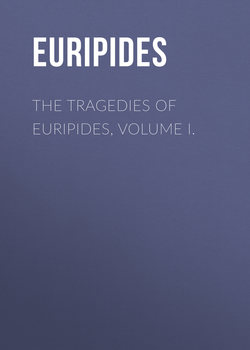Читать книгу The Tragedies of Euripides, Volume I. - Euripides - Страница 19
ORESTES
ORESTES
ELECTRA
ОглавлениеThere is no word so dreadful to relate, nor suffering, nor heaven-inflicted calamity, the burden of which human nature may not be compelled to bear. For Tantalus, the blest, (and I am not reproaching his fortune, when I say this,) the son of Jupiter, as they report, trembling at the rock which impends over his head, hangs in the air, and suffers this punishment, as they say indeed, because, although being a man, yet having the honor of a table in common with the Gods upon equal terms, he possessed an ungovernable tongue, a most disgraceful malady. He begat Pelops, and from him sprung Atreus, for whom the Goddess having carded the wool32 spun the thread of contention, and doomed him to make war on Thyestes his relation; (why must I commemorate things unspeakable?) But Atreus then33 killed his children – and feasted him. But from Atreus, for I pass over in silence the misfortunes which intervened, sprung Agamemnon, the illustrious, (if he was indeed illustrious,) and Menelaus; their mother Aërope of Crete. But Menelaus indeed marries Helen, the hated of the Gods, but King Agamemnon obtained Clytæmnestra's bed, memorable throughout the Grecians: from whom we virgins were born, three from one mother; Chrysothemis, and Iphigenia, and myself Electra; and Orestes the male part of the family, from a most unholy mother, who slew her husband, having covered him around with an inextricable robe; the reason however it is not decorous in a virgin to tell; I leave this undeclared for men to consider as they will. But why indeed must I accuse the injustice of Phœbus? Yet persuaded he Orestes to kill that mother that brought him forth, a deed which gained not a good report from all men. But nevertheless he did slay her, as he would not be disobedient to the God. I also took a share in the murder, but such as a woman ought to take. As did Pylades also who perpetrated this deed with us. From that time wasting away, the wretched Orestes is afflicted with a grievous malady, but falling on his couch there lies, but his mother's blood whirls him to frenzy (for I dread to mention those Goddesses, the Eumenides, who persecute him with terror). Moreover this is the sixth day since his slaughtered mother was purified by fire as to her body. During which he has neither taken any food down his throat, he has not bathed his limbs, but covered beneath his cloak, when indeed his body is lightened of its disease, on coming to his right mind he weeps, but at another time starts suddenly from his couch, as a colt from his yoke. But it has been decreed by this city of Argos, that no one shall receive us who have slain a mother under their roof, nor at their fire, and that none shall speak to us; but this is the appointed day, in the which the city of the Argives will pronounce their vote, whether it is fitting that we should die being stoned with stones, or having whet the sword, should plunge it into our necks. But I yet have some hope that we may not die, for Menelaus has arrived at this country from Troy, and filling the Nauplian harbor with his oars is mooring his fleet off the shore, having been lost in wanderings from Troy a long time: but the much-afflicted Helen has he sent before to our palace, having taken advantage of the night, lest any of those, whose children died under Ilium, when they saw her coming, by day, might go so far as to stone her; but she is within bewailing her sister, and the calamity of her family. She has however some consolation in her woes, for the virgin Hermione, whom Menelaus bringing from Sparta, left at our palace, when he sailed to Troy, and gave as a charge to my mother to bring up, in her she rejoices, and forgets her miseries. But I am looking at each avenue when I shall see Menelaus present, since, for the rest, we ride on slender power,34 if we receive not some succor from him; the house of the unfortunate is an embarrassed state of affairs.
32
στεμματα, ερια, Schol. "eo quod colum cingant seu coronant," Scapula explains it.
33
"Then" is not to be considered as signifying point of time, but it is meant to express ουν, continuativam. See Hoogeveen de Particula ουν, Sect. ii. § 6.
34
The original Greek phrase was ελπιδος λεπτης, which Euripides has changed to ασθενους ‛ρωμης, though the other had equally suited the metre. But Euripides is fond of slight alterations in proverbs. PORSON.
